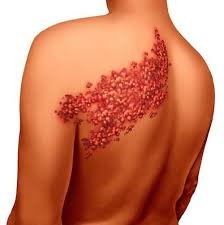Shingles, also known as herpes zoster, is a viral infection caused by the varicella-zoster virus, the same virus responsible for chickenpox. After a person recovers from chickenpox, the virus remains dormant in nerve tissue near the spinal cord and brain. Years later, the virus may reactivate, causing shingles. Shingles typically manifests as a painful rash that occurs in a specific area of the body, usually on one side of the torso or face, following the distribution of a nerve.
Symptoms of Shingles:
- Pain and Tingling: Before the rash appears, many individuals experience pain, burning, itching, or tingling in the affected area. This may occur several days to a week before the rash develops.
- Rash: The characteristic rash of shingles consists of clusters of fluid-filled blisters that break open and crust over. The rash typically appears as a single stripe or band on one side of the body, most commonly on the torso or face. It follows the path of a nerve.
- Other Symptoms: Along with the rash, individuals may experience fever, headache, fatigue, and sensitivity to light.
Causes of Shingles:
The reactivation of the varicella-zoster virus that causes shingles is associated with several factors, including:
- Weakened Immune System: A weakened immune system due to aging, stress, certain medical conditions (such as HIV/AIDS), or medications (such as corticosteroids or chemotherapy) can increase the risk of shingles.
- Previous Chickenpox Infection: Shingles occurs in individuals who have previously had chickenpox. The varicella-zoster virus remains dormant in nerve cells after chickenpox and can reactivate years later.
Treatment of Shingles:
Treatment for shingles aims to relieve symptoms, shorten the duration of the illness, and prevent complications. Treatment options may include:
- Antiviral Medications: Prescription antiviral drugs, such as acyclovir, valacyclovir, or famciclovir, can help reduce the severity and duration of the shingles rash if started within 72 hours of the rash onset.
- Pain Management: Over-the-counter pain relievers such as ibuprofen or acetaminophen may help alleviate pain and discomfort associated with shingles. In some cases, prescription pain medications or topical creams containing capsaicin or lidocaine may be recommended.
- Antiviral Medications: Prescription antiviral drugs, such as acyclovir, valacyclovir, or famciclovir, can help reduce the severity and duration of the shingles rash if started within 72 hours of the rash onset.
- Pain Management: Over-the-counter pain relievers such as ibuprofen or acetaminophen may help alleviate pain and discomfort associated with shingles. In some cases, prescription pain medications or topical creams containing capsaicin or lidocaine may be recommended.
- Prevention of Complications: It’s essential to keep the rash clean and dry to prevent bacterial infections. Avoid scratching the rash, as this can lead to further complications. Additionally, individuals with shingles should avoid contact with individuals who have not had chickenpox or the varicella vaccine, as shingles can be contagious until the rash crusts over.
- Vaccination: The shingles vaccine, which is recommended for adults aged 50 and older, can help reduce the risk of developing shingles and lessen the severity of the illness in those who do develop it. The vaccine is available as two doses, typically administered several months apart.
Complications of Shingles:
Complications of shingles can include postherpetic neuralgia, a condition characterized by persistent nerve pain in the affected area even after the rash has healed. Other potential complications include bacterial skin infections, eye complications (if the rash occurs near the eyes), and neurological complications such as meningitis or encephalitis (inflammation of the brain).
If you suspect you have shingles or are experiencing symptoms, it’s important to consult a healthcare professional for proper diagnosis and treatment. Early treatment can help reduce the severity of symptoms and prevent complications.
Thanks for visiting Gymbag4u.com
You may also love reading our following articles. The Importance of Preventive Medical Visits – GymBag4U and Understanding Ramsay Hunt Syndrome Causes, Symptoms, and Treatment Options (gymbag4u.com) and Vitamin C Enriched Foods that fight viral infections – GymBag4U and Infectious disease selfcare techniques – GymBag4U
